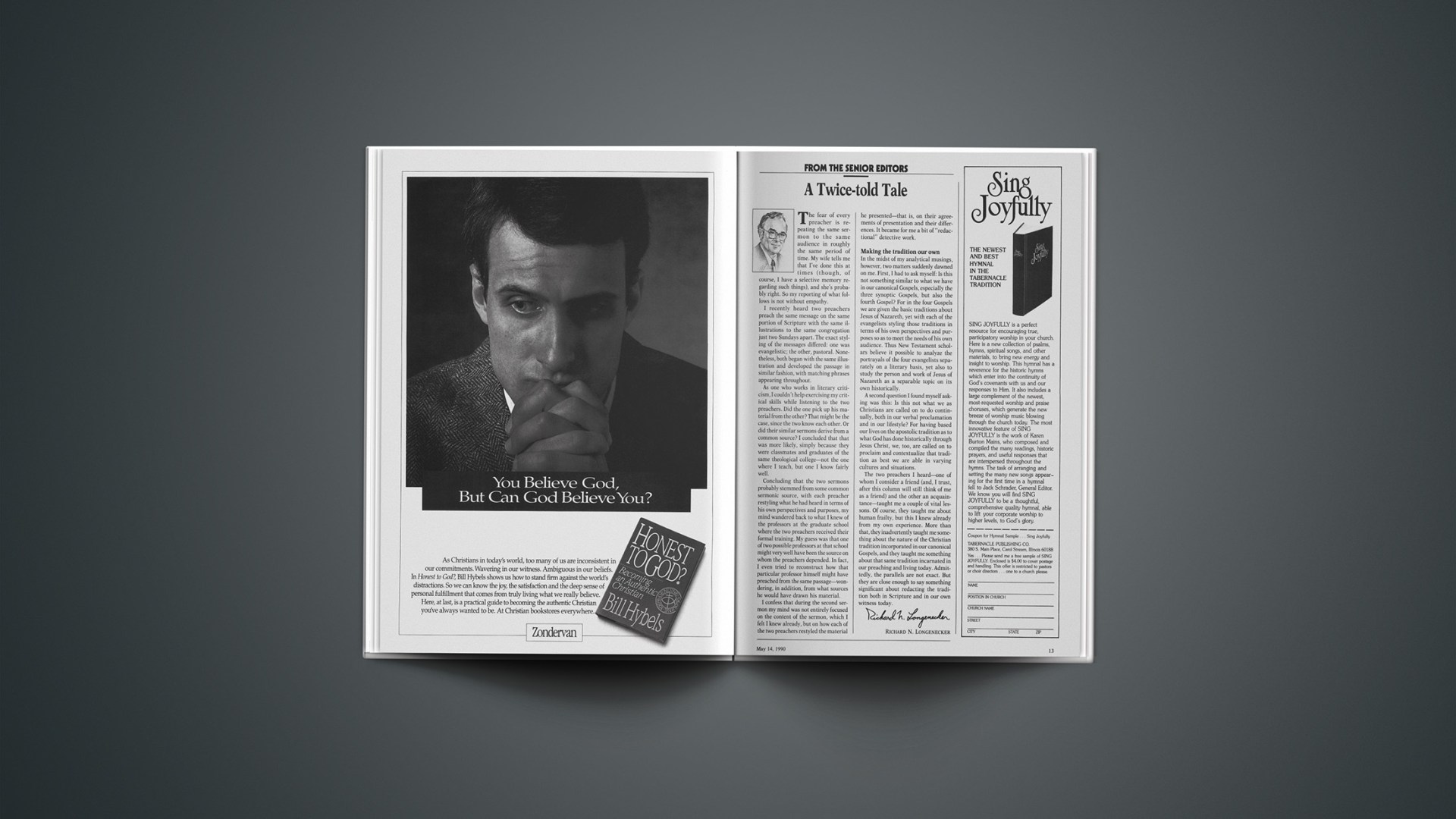The fear of every preacher is repeating the same sermon to the same audience in roughly the same period of time. My wife tells me that I’ve done this at times (though, of course, I have a selective memory regarding such things), and she’s probably right. So my reporting of what follows is not without empathy.
I recently heard two preachers preach the same message on the same portion of Scripture with the same illustrations to the same congregation just two Sundays apart. The exact styling of the messages differed: one was evangelistic; the other, pastoral. Nonetheless, both began with the same illustration and developed the passage in similar fashion, with matching phrases appearing throughout.
As one who works in literary criticism, I couldn’t help exercising my critical skills while listening to the two preachers. Did the one pick up his material from the other? That might be the case, since the two know each other. Or did their similar sermons derive from a common source? I concluded that that was more likely, simply because they were classmates and graduates of the same theological college—not the one where I teach, but one I know fairly well.
Concluding that the two sermons probably stemmed from some common sermonic source, with each preacher restyling what he had heard in terms of his own perspectives and purposes, my mind wandered back to what I knew of the professors at the graduate school where the two preachers received their formal training. My guess was that one of two possible professors at that school might very well have been the source on whom the preachers depended. In fact, I even tried to reconstruct how that particular professor himself might have preached from the same passage—wondering, in addition, from what sources he would have drawn his material.
I confess that during the second sermon my mind was not entirely focused on the content of the sermon, which I felt I knew already, but on how each of the two preachers restyled the material he presented—that is, on their agreements of presentation and their differences. It became for me a bit of “redactional” detective work.
Making The Tradition Our Own
In the midst of my analytical musings, however, two matters suddenly dawned on me. First, I had to ask myself: Is this not something similar to what we have in our canonical Gospels, especially the three synoptic Gospels, but also the fourth Gospel? For in the four Gospels we are given the basic traditions about Jesus of Nazareth, yet with each of the evangelists styling those traditions in terms of his own perspectives and purposes so as to meet the needs of his own audience. Thus New Testament scholars believe it possible to analyze the portrayals of the four evangelists separately on a literary basis, yet also to study the person and work of Jesus of Nazareth as a separable topic on its own historically.
A second question I found myself asking was this: Is this not what we as Christians are called on to do continually, both in our verbal proclamation and in our lifestyle? For having based our lives on the apostolic tradition as to what God has done historically through Jesus Christ, we, too, are called on to proclaim and contextualize that tradition as best we are able in varying cultures and situations.
The two preachers I heard—one of whom I consider a friend (and, I trust, after this column will still think of me as a friend) and the other an acquaintance—taught me a couple of vital lessons. Of course, they taught me about human frailty, but this I knew already from my own experience. More than that, they inadvertently taught me something about the nature of the Christian tradition incorporated in our canonical Gospels, and they taught me something about that same tradition incarnated in our preaching and living today. Admittedly, the parallels are not exact. But they are close enough to say something significant about redacting the tradition both in Scripture and in our own witness today.
RICHARD N. LONGENECKER










